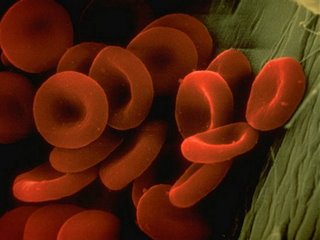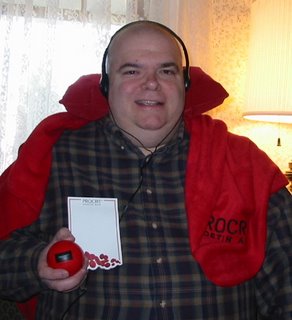 This morning I attend a seminar on Cancer Fatigue at Ocean Medical Center. I learned about it from a flyer I picked up in Dr. Lerner's office. I'm certainly experiencing fatigue, so Why not? I asked myself. Maybe I'll learn something.
This morning I attend a seminar on Cancer Fatigue at Ocean Medical Center. I learned about it from a flyer I picked up in Dr. Lerner's office. I'm certainly experiencing fatigue, so Why not? I asked myself. Maybe I'll learn something.It's an older crowd. With one exception, I may be the youngest cancer survivor there. But that reflects the general cancer demographics, so it's no real surprise.
I do learn a few things. Fatigue is a problem reported by 90% of chemotherapy patients, yet only between 60% and 70% of physicians mention it as a serious concern. That, in itself, is a telling statistic. It's a side effect mentioned by more patients than any other, yet it's not on the therapeutic radar screen of a significant number of physicians.
That's probably because some cancer fatigue is nebulous: hard to define, hard to address. From my experience, though, I'd say it's very real. It's a kind of malaise, a tiredness without feeling sleepy. Getting more rest doesn't help. I also know that my physical stamina has declined sharply: when I'm walking on the boardwalk, and have to stop every few hundred feet and sit on a bench to catch my breath, I know something's very different.
Fatigue can be caused by a low red blood-cell count (anemia), which can be a side-effect of various chemotherapy drugs. It can also be a side-effect of the cancer itself. A third possibility is that it can be the result of certain toxins that are released into the bloodstream as the cancer cells are destroyed. Since my blood counts have been fine so far, and since I was showing no cancer symptoms at the time I began chemotherapy, it would seem to me that the third explanation is the most likely in my case. But that's my uninformed, non-medical opinion.
 The doctor making the Power Point presentation – someone brought down from North Jersey for the occasion – seems most interested in fatigue that can be explained by blood chemistry. Chemotherapy can depress the counts of any one of the three main components of blood: red cells, white cells or platelets. If the red-cell count is down, the problem is anemia. If the white cells are down, the problem is a depressed immune system. If the platelets are down, the problem is inadequate blood clotting, leading to bleeding. The good news, our guest speaker tells us, is that these blood chemistry-related difficulties are all easily addressed. I already receive a Neulasta shot, 24 hours after each chemo treatment, as a prophylactic measure to boost my white blood-cell count. Were I to develop a platelet deficiency, there's a pharmaceutical solution to that as well. If the problem is anemia (a low red-cell count), there are a couple of drug possibilities that can address that situation.
The doctor making the Power Point presentation – someone brought down from North Jersey for the occasion – seems most interested in fatigue that can be explained by blood chemistry. Chemotherapy can depress the counts of any one of the three main components of blood: red cells, white cells or platelets. If the red-cell count is down, the problem is anemia. If the white cells are down, the problem is a depressed immune system. If the platelets are down, the problem is inadequate blood clotting, leading to bleeding. The good news, our guest speaker tells us, is that these blood chemistry-related difficulties are all easily addressed. I already receive a Neulasta shot, 24 hours after each chemo treatment, as a prophylactic measure to boost my white blood-cell count. Were I to develop a platelet deficiency, there's a pharmaceutical solution to that as well. If the problem is anemia (a low red-cell count), there are a couple of drug possibilities that can address that situation. There are two tables at the back of the room with literature on them, and representatives to help distribute it. One is staffed by the American Cancer Society, containing a number of helpful publications. The other table is sponsored by Ortho Biotech, the makers of Procrit – one of the leading anti-anemia drugs. The doctor making the presentation mentions Procrit several times as he talks about anemia.
There are two tables at the back of the room with literature on them, and representatives to help distribute it. One is staffed by the American Cancer Society, containing a number of helpful publications. The other table is sponsored by Ortho Biotech, the makers of Procrit – one of the leading anti-anemia drugs. The doctor making the presentation mentions Procrit several times as he talks about anemia. During the question-and-answer time, one of my fellow patients asks about a drug called Aranesp, which is manufactured by Amgen. This drug is also used for anemia, but is somewhat longer-lasting . The doctor explains that Procrit is a more natural drug – derived from a hormone produced by our own kidneys that boosts red blood-cell production. Aranesp is a good drug too, he says, but it's a genetically-modified version of that same kidney hormone (his assumption seems to be that “natural” is always better). He finds that many of his own patients actually prefer to come to his office more frequently for their weekly Procrit shots, because it gives them an opportunity to see him, if only in passing. Trying for some humor, he refers to that kind of visit as a "drive-by shooting." Apologizing for the bad joke, he explains that, since he's Italian-American and from North Jersey, the Sopranos-style humor plays well in his neck of the woods.
During the question-and-answer time, one of my fellow patients asks about a drug called Aranesp, which is manufactured by Amgen. This drug is also used for anemia, but is somewhat longer-lasting . The doctor explains that Procrit is a more natural drug – derived from a hormone produced by our own kidneys that boosts red blood-cell production. Aranesp is a good drug too, he says, but it's a genetically-modified version of that same kidney hormone (his assumption seems to be that “natural” is always better). He finds that many of his own patients actually prefer to come to his office more frequently for their weekly Procrit shots, because it gives them an opportunity to see him, if only in passing. Trying for some humor, he refers to that kind of visit as a "drive-by shooting." Apologizing for the bad joke, he explains that, since he's Italian-American and from North Jersey, the Sopranos-style humor plays well in his neck of the woods.After the main speaker leaves (the distinguished specialist has got a busy schedule, the moderator explains), there's a panel discussion among several local medical practitioners: a clinical social worker, a medical educator, an oncology nurse, a physical therapist and an oncologist. The oncologist turns out to be my own physician, Dr. Lerner. The Procrit-vs-Aranesp discussion doesn't come up again, but I do know that Aranesp is the only anti-anemia medication I've heard Dr. Lerner talk about. One of his office staff gave me information about a clinical trial of a longer-lasting form of Aranesp, in case I ever need it. I was told, at the time, that – should I develop anemia – I would be asked to consider signing the consent forms to receive this more experimental form of the drug. So, my assumption is that Dr. Lerner has a somewhat different opinion of the relative merits of Aranesp over Procrit than does our keynote speaker (although the question never comes up).
 As the seminar ends, we're encouraged to stop at the Procrit table on the way out, to receive a bag containing some free gifts: a veritable cornucopia of pharmaceutical-company swag. There are the usual pens, notepads and Post-It notes, but there is also a lap blanket, an inflatable travel pillow, a rubber ball for hand exercises, and a portable CD player and a CD with guided-meditation exercises. All these items, except the CD player, are emblazoned with the Procrit logo.
As the seminar ends, we're encouraged to stop at the Procrit table on the way out, to receive a bag containing some free gifts: a veritable cornucopia of pharmaceutical-company swag. There are the usual pens, notepads and Post-It notes, but there is also a lap blanket, an inflatable travel pillow, a rubber ball for hand exercises, and a portable CD player and a CD with guided-meditation exercises. All these items, except the CD player, are emblazoned with the Procrit logo.I'm glad I went to the seminar, because I did learn a lot about cancer fatigue. But I also leave with the distinct feeling that I've been targeted by a rather intensive marketing effort on the part of Ortho Biotech. One unanswered question is, Who paid for the whole event? (My guess would be Ortho Biotech, but I can't be sure.) The Aranesp foot soldiers appear to be AWOL from this particular skirmish in the pharmaceutical wars – but chances are, they were never invited in the first place.
There's big money in cancer treatment, no doubt about it.
